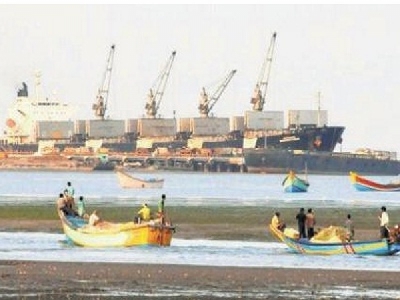
Posted on September 6, 2016
By Rahul Wadke, The Hindu BusinessLine
Even as the Modi government has ambitions to developing ports, logistics and coastal shipping sector through the Sagarmala project, in reality, coastal shipping continues to be hit by many issues, including higher expense per tonne when compared with the roads and rail sector.
Experts say the coastal shipping has still not taken off because of the high taxation and finance cost plaguing the sector.
Shipping industry veteran and Managing Director of Link Shipping and Management Captain Kiran Kamat said that Sagarmala is attempting to build ports but there is no investment in smaller ships. It has resulted in the logistics cost of transporting goods by coastal vessels expensive by 50 paise per tonne/per km when compared with the roads and rail sector. The trucks can overload the cargo but ships cannot do that. The shipping regulatory regime is stricter, he said.
A programme for developing coastal shipping was also attempted during the UPA regime through the National Shipping Board where a committee was also set up for developing the sector.
Longer term loans
Joint Managing Director of Chowgule & Co of the Chowgule Group, Ashok Chowgule, said that in the past attempts had been made to operate on the coast with second-hand ships, which were not meant for plying on the coast. “Such services failed but the message went out was that coastal shipping operations were not viable. The shipping companies require the right kind of vessels for coastal shipping business,” Chowgule said.
“For financing of such vessels, lower interest rate should be devised, which will give a flip to the sector. The RBI rules only allow term loans for seven years, while the life of a ship is much longer, therefore longer term loans are required. The banks and RBI should also look at this issue in a more focused manner,” he said. Chowgule pointed that dredging of small ports is also required. Even if the draft in small ports is increased by one meter, it will bring in more business. Today, entering into these ports is dependent on high tides, dredging will make these ports accessing round the clock. The turnaround time will also reduce.
Smaller ports
Today, the Dredging Corporation of India does not have the equipment to handle smaller ports. A number of small ports have not dredged in the last 10 years. Therefore smaller dredgers should be stationed on both coasts of the country by the government, which could be mobilised faster. This service should be provided by the government as an incentive to the ports, he said.
The shipping ministry wants coastal shipping and shipping building to go hand-in-hand, but Suraj Dialani, Business Head of Vijai Marine Shipyards, said that both the sectors are still not in sync with each other. Although the ministry wants the shipping building business to take off, but the sad part is that there is no demand for the coastal ships in the country, he said.
He said that when ships call on a port from China, Japan and Gujarat all of them are treated equally whether it is port dues or the immigration formalities for the crew or the jetty charges. But a coastal vessel from Gujarat carries only 2,000 tonnes of cargo, while the Chinese ships carry two lakh tonnes. The ports revenues are based on the size of the ship, therefore, the ship from Gujarat is given the last priority, he said.
Better relations
Director-Transport, CRISIL Infrastructure Advisory, Jagannarayan Padmanabhan, said that in order to provide the necessary thrust to coastal shipping in the country it is necessary that State and Central government work in tandem with each other by creating a joint working group for developing integrated transport system to ensure seamless end to end connectivity,
Provision of green channels at both major and non-major ports will help in reducing the time delays. Developing dedicated coastal shipping policy by all the maritime States in the country will provide the necessary push at the State-level. It will also benefit if the private sector shipping companies own the cargo from origin to destination and are able to provide a seamless and predictable service to the end consumers, he said in an e-mail statement.
Source: The Hindu Businesline





